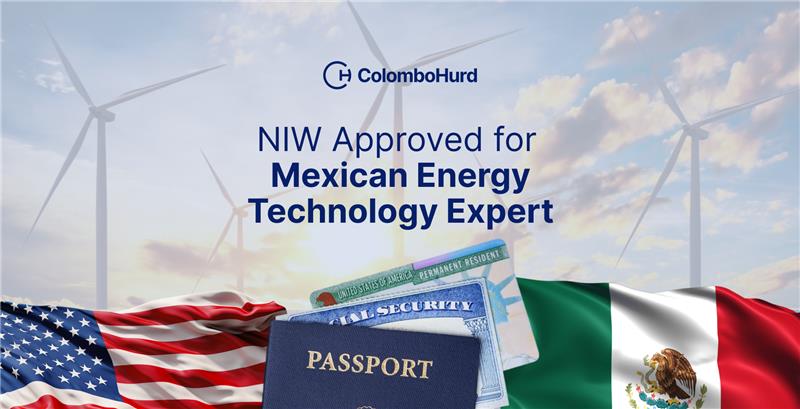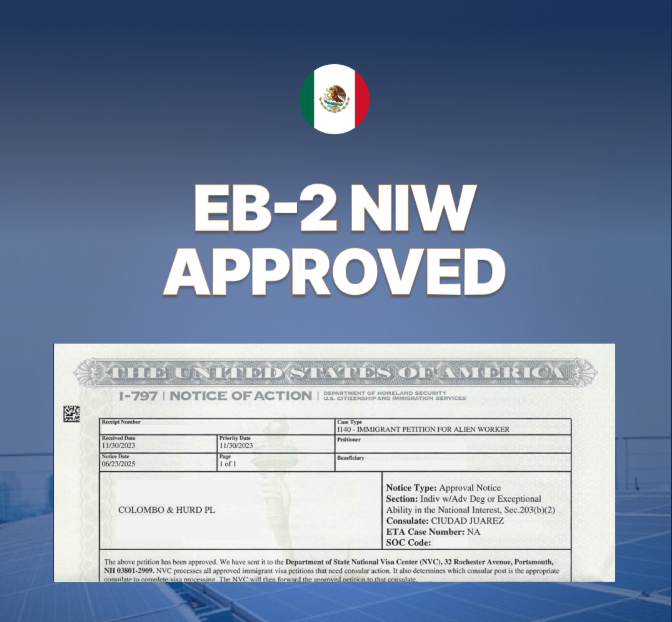Manufacturing Engineer
Colombo & Hurd Immigration Attorney Nizar Kafrouni shares a recent EB-2 NIW success story for one of his clients, a manufacturing engineer and energy technology expert from Mexico who ultimately secured approval in June of 2025, despite initial challenges from USCIS.

Our client, a manufacturing engineer from Mexico, brought impressive credentials to his NIW petition

With a master’s degree in manufacturing engineering technology from a U.S. university and the equivalent of a bachelor’s degree in mechatronics engineering from a prestigious Mexican institution, he had built a solid educational foundation in his field. His professional experience was equally compelling, spanning six years of progressive engineering roles. His career trajectory included positions as an assistant systems engineer trainee, engineer at a major automotive manufacturer, design process engineer, and most recently, plant engineer at a building products company. This diverse experience demonstrated his ability to apply engineering principles across multiple industries and contexts.
The client’s proposed endeavor centered on enhancing the United States’ electric power system while promoting sustainable energy adoption through the design and implementation of cost-effective, innovative 3D-printed water turbines tailored for energy applications in small communities and rural areas. Mr. Kafrouni explains why this client stood out and how his background aligned with NIW requirements: “What made this client’s case compelling was the unique, innovative, and practical nature of his proposed endeavor: developing cost-effective, 3D-printed water turbines for alternative energy generation, specifically targeting underserved rural and small communities. His background in engineering and manufacturing technology positioned him to implement this initiative effectively, aligning with the National Interest Waiver (NIW) requirements. The project’s potential to enhance grid reliability, support energy independence, and promote sustainable power solutions are aligned with the U.S. interest.”
Addressing RFE challenges systematically while building a compelling case for the client’s national importance and unique positioning
The legal team developed a comprehensive response strategy that addressed each of USCIS’s concerns systematically while building a compelling case for the client’s national importance and unique positioning.
Demonstrating National Importance
The response provided a detailed description of the client’s proposed endeavor, emphasizing its alignment with current national priorities. The team highlighted how the work supported the Executive Branch’s declaration of a National Energy Emergency and aligned with key government initiatives including the Grid Modernization Initiative, Advanced Research on Integrated Energy Systems platform, and rural energy programs.
Mr. Kafrouni explains how we aligned the client’s endeavor with current national energy policies:
“The recent policy directions under the current Administration, as reflected in the White House publications, strongly support the relevance and national importance of the proposed endeavor. The administration is actively working to eliminate excessive barriers that obstruct energy infrastructure projects, reaffirming federal authority to streamline permitting and support energy development across the country. This policy directly complements the client’s initiative, which leverages existing infrastructure to implement localized, low-impact energy generation without the regulatory burdens typically associated with large-scale facilities.”
Through a business plan, the economic impact was quantified through projections showing the client’s company would employ at least 11 personnel by Year 5, with tax revenue growing significantly from Year 1 to Year 5. This economic benefit was particularly significant as it would occur in an area comprised of U.S. Opportunity Zones.
The team also secured an independent recommendation letter from a professional in the field and a recommendation letter from an economist, attesting to the national and economic benefits of the client’s proposed endeavor and its importance to the energy sector.
Addressing the Third Prong
The response argued that the client’s dynamic role in advancing energy technology through his unique expertise made the labor certification process impractical. The team demonstrated that his specialized skill set—combining engineering, manufacturing technology, and innovative 3D printing applications for alternative energy systems—was not easily adaptable to the standard labor certification process.
“Our RFE response strategy was multi-faceted,” explains Mr. Kafrouni. “We focused on several key areas that demonstrated the true scope and impact of the client’s work.”
These areas include:
Client’s Achievements
- Summarizing key accomplishments to show contributions are valuable to the U.S., even if qualified U.S. workers are available, while emphasizing the client’s unique skill and innovative work.
- Reiterating that the client’s contributions significantly benefit the U.S., regardless of available U.S. workers, while also highlighting the urgency and need of the client’s services.
Plan and Economic Impact
- Showing potential for U.S. job creation.
- Demonstrating pricing structure will not adversely affect U.S. workers.
- Detailing how the project will contribute to the local and national economy
- Connecting the location to national economic development initiatives.
- Highlighting the entrepreneurial nature of the project, making a specific job offer impractical.
Urgent Need and National Interest
- Showing that the endeavor is tied to a time-sensitive national initiative and explaining why the services are in high demand and urgently needed.
USCIS issued a Request for Evidence (RFE) challenging two critical aspects of the NIW petition
Despite the client’s strong qualifications, USCIS issued a Request for Evidence (RFE) challenging two critical aspects of the NIW petition: the national importance of the endeavor and whether it would be beneficial to the United States to waive the job offer and labor certification requirements.
Specifically, USCIS questioned whether the client’s work would truly have national importance, arguing that it would only benefit those to whom the petitioner provided his services and resulting products.
“USCIS was taking a very narrow view of national importance,” explains Mr. Kafrouni. “They were essentially arguing that because the client’s proposed endeavor is focused on a certain area or specific communities, it couldn’t possibly have importance at a national level. This completely missed the broader implications of energy infrastructure development and the cumulative impact of local solutions on national energy goals.”
Additionally, USCIS challenged the third prong of the NIW test, questioning whether the petitioner had demonstrated that his knowledge or skills could not be easily articulated in a labor certification, and whether his contributions would benefit the United States even if qualified U.S. workers were available.
The RFE response strategy required both carefully drafted legal arguments and substantial additional evidence.
“We had to address a fundamental legal misconception,” notes Mr. Kafrouni. “USCIS was applying an outdated interpretation of national importance that focused too heavily on geographic scope rather than the potential impact of the endeavor.”
The legal arguments highlighted that under Matter of Dhanasar, USCIS officers should assess the substance and importance of the proposed endeavor itself, rather than focusing on its geographic reach. A project that is concentrated in one specific region of the United States may still be considered nationally important. Matter of Dhanasar recognized that certain efforts—though local or regional in scope—can nonetheless carry national importance. (Matter of Dhanasar, 26 I&N Dec. 884, 887, 889 [AAO 2016])
Wondering if You Qualify?
Your background may align with the requirements for the EB-2 NIW.
The RFE response successfully addressed each of USCIS’s concerns, resulting in NIW approval
The approval recognized the national importance of the client’s work in energy and acknowledged that waiving the job offer and labor certification requirements would benefit the United States.
Immediate Impact
With NIW approval secured, the client is able to move forward with his business plans. He had already established his company and received two letters of interest from professionals expressing interest in collaboration. The approval provided the immigration certainty needed to pursue these opportunities fully.
Future Opportunities
The NIW approval opens significant doors for the client’s career and business development. He plans to employ staff within 12 to 18 months and has the potential to build his company while collaborating with other professionals in energy and manufacturing technology. The approval also positioned him to contribute more effectively to U.S. energy infrastructure development and rural community empowerment through sustainable technology solutions.
With the current administration’s focus on energy independence and infrastructure modernization, professionals in the client’s field have even more opportunities than before. Recent executive orders and initiatives have created an unprecedented demand for experts in energy technology and advanced manufacturing. As detailed in our article “Opportunities for NIW Under Trump Energy Policies,” the new policy landscape particularly favors professionals working on innovative energy solutions and domestic manufacturing capabilities—exactly the areas where our client’s expertise shines.
Key Takeaways
This case demonstrates that even when facing significant challenges through an RFE, a well-positioned NIW petition can succeed with the right legal strategy.
“While receiving a Request for Evidence (RFE) is never ideal and understandably causes concern, our experienced RFE team is here to guide and support our clients every step of the way. We approach each RFE with care, strategy, and a commitment to make the process as smooth and collaborative as possible,” says Mr. Kafrouni.
The key factors that contributed to this approval included:
- Comprehensive RFE Strategy and Documentation: Providing detailed evidence of the national importance and scope of the proposed endeavor
- Strategic Alignment: Demonstrating clear connections between the client’s work and national priorities
- Economic Impact: Quantifying the economic benefits and job creation potential
- Expert Validation: Securing independent professional endorsements of the work’s importance
- Thorough RFE Response: Addressing each concern systematically while building a compelling narrative
Mr. Kafrouni shares his final thoughts on this case:
“There’s something truly special about helping a client receive their NIW approval. It’s not just a legal success, it’s a moment filled with hope, pride, and possibility. Behind every approval is a story of years of hard work, perseverance, and a deep desire to make a difference. It’s a privilege to support professionals who are genuinely passionate about their fields—whether they’re scientists, engineers, healthcare workers, or innovators—people who are quietly shaping a better future. Watching their dreams come closer to reality, knowing we’ve played even a small part in that journey, is incredibly humbling. That’s when you realize this isn’t just what we do, it’s why we do it.”
“There’s something truly special about helping a client receive their NIW approval. It’s not just a legal success, it’s a moment filled with hope, pride, and possibility. Behind every approval is a story of years of hard work, perseverance, and a deep desire to make a difference.”

